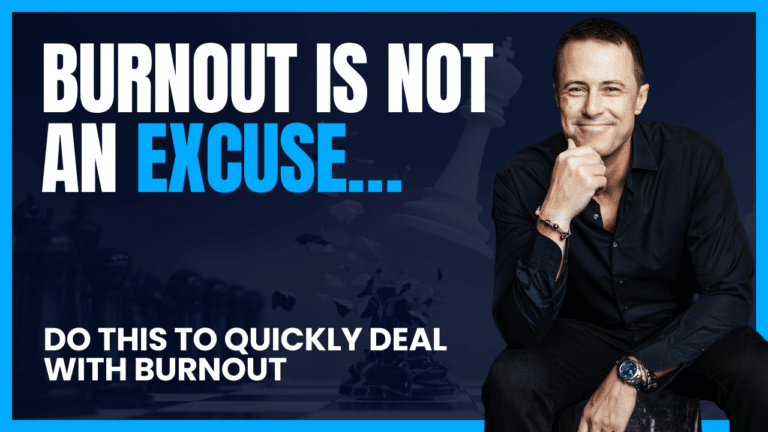How To Become More Comfortable With Conflict – A Completely Different Approach
You can fire a VP without blinking but can’t tell your neighbor you won’t watch their dog. You can negotiate million-dollar deals but panic when someone seems upset with you.
Let me ask you something: How comfortable are you with conflict?
Not violent confrontation or yelling. Just simple disagreements where someone might be unhappy, angry, or disappointed.
Do disagreements make you uncomfortable? Is it hard to say no when someone asks you for something? Do you feel like you have to say yes?
When people around you are upset or chaotic, does it make you feel like something’s wrong with YOU? Like you did something wrong or need to fix it?
If you’re nodding along, keep reading. What I’m about to share can change everything.
The High Achiever’s Hidden Prison
Here’s what I see over and over with successful people: They’re huge givers, providers, and protectors. They show up for everyone in amazing ways and provide tons of value.
But they feel alone. Unsupported. Like all their giving isn’t coming back to them.
They know they’re capable of more but can’t step into their full potential because their plate is always full – with everyone else’s stuff.
Sound exhausting? That’s because it is.
You’re bending over backwards to make sure everyone around you is okay while you’re slowly burning out. And when someone asks if you’re okay, what do you say?
“I’m fine. I’m good.”
Why? Because you don’t want to upset them or make them worry.
Here’s the problem: If you’re not okay with conflict, you’ll engage in people-pleasing. You go along to get along. When you’re not okay with something, you just deal with it instead of saying something.
You’re eating the conflict instead of having it.
But here’s the twist: If there’s conflict to be had and you avoid it, who do you end up in conflict with? Yourself.
Where This All Started
Let me take you back to where this pattern began. Picture a five-year-old in a grocery store with a parent. The kid sees something they want – candy, a toy, whatever. Parent says no.
The kid starts crying, then throws a full tantrum. Kicking, screaming, losing it completely.
Now, if they were alone, most parents would just let the kid cry it out. But they’re in public. And we’ve been socially conditioned not to make other people uncomfortable.
(Ever notice how we always answer “How are you?” with “Good” even when we’re not? Same thing.)
So the parent tries to stop the kid: “What you’re doing is not okay. Stop acting like a baby. Be good.”
Here’s what’s crazy: After a tantrum, kids are completely fine 10 minutes later. They got it out, processed it, moved on. They’re emotional processing machines.
But the emotionally constipated adult who’s been angry about something for months tells the kid their way of processing is wrong.
This is called emotional invalidation. And it’s where you learned to stop trusting yourself.
The kid thinks: “This big person knows everything. They can drive, buy food, answer all my questions. If they say what I’m feeling is wrong, it must be wrong.”
In that moment, you start to distrust your inner guidance. You start believing you can’t trust what you’re feeling.
The Devastating Result
When you can’t trust yourself, you have to find someone else to trust. So you start looking at the people around you to tell you whether you’re okay.
You’ve outsourced your guidance system.
This makes it incredibly risky to upset anyone. If they’re your reference system and they get upset, that must mean something’s wrong with you.
No wonder conflict feels dangerous. Your entire sense of being okay depends on their emotional state.
This creates conditions where you have to bend over backwards to make sure everyone around you is okay, even if it means burning yourself out.
You’ll want other people to take care of themselves, but when it comes to you? You don’t do it.
Why Traditional Solutions Don’t Work
“Just be more assertive!” “Practice gratitude!” “Try mindfulness!” “Focus on the positive!”
I’ve heard it all. These things are helpful, but they don’t solve THIS problem. They’re good solutions for other issues, not this one.
You can’t assert your way out of a foundation problem. You can’t gratitude-journal your way past corrupted core programming.
The Real Solution
Instead of looking outside yourself to know if you’re okay, start referencing what’s inside.
Go inside and ask yourself: How do I feel? Am I okay? What do I need? What’s going on inside me?
Here’s the fear that will come up: “If I start taking care of myself, I won’t be taking care of everyone else. Then they won’t be okay.”
That’s not true.
Just because you’re not doing everything for them doesn’t mean those things won’t get done. They’ll become more resourceful. They’ll step up and do things for themselves.
That’s actually a good thing. It’s empowering. It allows them to feel like they’re contributing.
I had relationships where I did everything. You know how they ended? The other person said, “I could disappear from your life and nothing would change. You never let me do anything.”
People stick where they’re invested. Part of that investment is them doing things.
What Changes When You Stop People-Pleasing
When you stop referencing other people to know if you’re okay, everything shifts:
- You can ask for what you want
- You can have necessary disagreements
- You can be comfortable when someone else is upset
- You can say no without guilt
Funny story: I was in a men’s group four years ago. They asked why I hadn’t hit certain targets. I said my plate was too full.
One guy asked, “When’s the last time you said no? How many times have you said no this year?”
My response? “Why would I do that? That’s rude.”
I literally thought saying no was rude. I had to use ChatGPT to come up with 25 different ways to say no because I’d said it so rarely.
If I can learn this, so can you.
The Path Forward
Saying no allows you to reduce commitments to other people. This lets you put your agenda first. Which lets you step into the destiny that only you can fulfill.
When you can do this, life becomes so much easier. It’s easier to achieve what you want. It’s easier to be happy because how you feel is no longer dependent on how everyone else is doing.
Look, there was nothing wrong with that little kid in the grocery store. The kid just wanted what they wanted. The problem was with the adult who couldn’t hold space for normal emotional processing.
That little kid had the right idea.
What you resist persists. The same adults who stop kids from expressing emotions are the ones who feel draining emotions for months because they won’t let themselves feel fully and move on.
Your Next Step
Start the process of looking inside to figure out how you’re doing. Let other people check in with themselves.
This is a process. It takes time. You might need help.
But when you can reference your internal guidance instead of everyone else’s emotions, you can finally build the life and business you actually want.
You can be proud of yourself instead of constantly managing everyone else’s feelings.
The little kid in the grocery store wasn’t broken. Neither are you. You just learned to ignore the guidance system that’s been right your entire life.
Time to start listening again.
Ready to stop managing everyone else’s emotions and start trusting your own guidance? Your internal compass has been waiting for you to come home.
Jason Ayers helps high-achievers make big decisions and bold moves in 90 days or less…
Jason drives profound transformation through his five-step Visionary Alignment Process, helping leaders reveal hidden patterns, clarify true desires, and align Mind, Mission, and Systems for lasting impact.
The result? Clients who finally begin to feel as successful on the inside as they appear on the outside. His clients don’t just optimize – they evolve.
Ready to step into the best version of yourself?
Warning: side-effects may include improved relationships, exceeding your goals, feeling more fulfilled and falling in love with your life.



